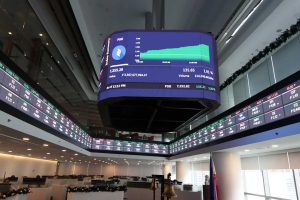If the Senate leak was erroneous or just chismis, is it still a leak?

The Senate plenary session on Tuesday last week was perturbed when Senator Jinggoy Estrada expressed dismay at the revelation of what transpired in their executive session the day before. He told the Senate:
“Just before we entered, much to my dismay, there was a news report that identified eight or nine senators who wanted to restore the confidential and intel fund of the VP and DepEd (Vice-President and Department of Education). I wish to tell the people of the Philippines that there was no votation that happened with regard to the intel fund of the VP and DepEd.
“In fact, we had an executive session. I do not know who leaked our conversation to this media outlet. This is the first time that I encountered a leakage. I do not want to name names, this is a violation of our rules. We never voted with regard to all the intelligence and confidential funds. In fact, we agreed unanimously to remove all the confidential and intelligence funds not only that of the Vice-President but all civilian agencies that have confi and intel funds.
“I will just read, first on the list, Padilla, Go, Revilla, Dela Rosa, Estrada, Lapid, Tolentino and Villar. They are putting us in a bad light. I condemned this, I take offense of this. I really felt insulted. I stand before you, I want to make this recommendation to summon this media outlet and ask them who among us violated our rules. Who among us leaked what transpired in our executive session yesterday.”
Senate President Migz Zubiri said he too was very disappointed over the leak. “I too am very disappointed. When we say executive session, we are bound by rules of both House of Representatives and rules of the Senate.”
Senate Majority Floor Leader Senator Joel Villanueva also expressed concern over the alleged leak. Said he, “It’s not just the leak or chismis (gossip). It’s more of the sanctity of the executive session. How will the people trust us if our executive sessions turn into something like this?”
He cited Rule XLVII, Section 126 of the Rules of the Senate which states that “The executive session of the Senate shall be held always in closed doors. In such sessions only the Secretary, the Sergeant-at-Arms, and/or such other persons as may be authorized by the Senate to the session hall.”
The rule further stated that “The President as well as the Senators and the officials and employees of the Senate shall absolutely refrain from divulging any of the confidential matter taken up by the Senate, and all proceedings which might have taken place….. Any senator who violates the provisions contained in the preceding section may, by a two-thirds vote of all the senators, be expelled from the Senate. And if the violator is an official or employee of the Senate, he shall be dismissed.”
Senator Ronald dela Rosa agreed, saying in a mixture of English and Pilipino: “This is not a laughing matter, this is serious. Filipino people are watching us right now, they will say so that is what the Senate is now, it cannot be trusted, what they discuss among themselves, they leak to media. It is very dangerous.”
Upon his motion, Senate President Zubiri ordered the Senate Committee on Ethics and Privileges to investigate the alleged leak of information.
But to Senator Chiz Escudero, there was no leak of what really transpired in the executive session as what was written by the said media outlet was not accurate. “That is just chismis,” said the senator.
That the Senate was disconcerted by Senator Estrada’s expression of dismay raised several questions:
1. Why was the deliberation on an item in the proposed 2024 budget conducted in an executive session?
2. Why are some senators disturbed by the revelation of their stand on the confidential fund in the proposed budget?
3. Why are they bent on finding out who leaked non-confidential information?
According to the Rules of the Senate, the Senate or any of its Committees may conduct formal inquiries or investigations in aid of legislation. Such inquiries may refer to the implementation or re-examination of any law or appropriation. If the Committee believes that the interrogation of a witness in a public hearing might endanger national security, it may conduct its inquiry in an executive session.
As the deliberations on the confidential funds did not include the interrogation of a witness whose testimony might endanger national security, the deliberations should not have been conducted in an executive session. The House of Representatives conducted an inquiry into that same item in the proposed 2024 budget during its plenary session. Vice-President and concurrent Secretary of Education Sara Duterte, proponent of the confidential and intelligence funds, attended that plenary session to answer questions posed by members of the chamber.
The two-day deliberations on that item in the proposed budget were televised. National security was not compromised nor was it ever in danger during that plenary session. The senators conducting the deliberations on the same item among themselves behind closed doors makes one wonder.
Also a matter of perplexity is the indignation of some senators over the disclosure of their stand on Vice-President Duterte’s proposal to allocate confidential funds for the Office of the Vice-President and for the Department of Education. The open and televised deliberations in the House of Representatives brought grave threats upon a member and a pejorative label upon the entire House. Is that why some senators resented the report on how they stood on the issue at hand?
Senator Estrada made it clear on the Senate floor, obviously for the benefit of the press, that the senators were unanimous in removing from the budget all the confidential and intelligence funds, not only those of the Vice-President but of all civilian agencies. He sounded like he was saying: “Don’t single out any one of us. We were one on the removal of confi and intel funds for all civilian agencies from the budget.”
But the news report identified Senator Estrada as one of eight senators who wanted to restore the confidential and intelligence funds of the Vice-President and the Department of Education. That should shield him from any threat of harm or negative tag. Yet, he said the report put him in a bad light. I wonder if he was thinking of an episode in the history of the Senate involving his father, at the time the president of the Philippines.
During his impeachment trial, the senators, acting as judges, were made to vote on whether to open an envelope or not. The contents of the envelope were believed to be incriminating to President Estrada. Eleven senators voted against opening the envelope, in effect dismissing potentially damaging evidence against the President. That vote led to EDSA II and eventually to the ouster of President Estrada. The 11 senators have gone down in history as the Craven Eleven. Maybe Senator Jinggoy Estrada would not want to go down in history as one of the Butterflyweight Eight or the Lackey Eight or some other derogatory label.
It should be noted that among the senators back then, only Senator Loren Legarda is a member of the current Senate. She voted to open the envelope.
Senators Zubiri, Villanueva, and Dela Rosa are so agitated about the supposed leak that they called for an investigation to determine who provided the information to the media outlet so that he or she could be ousted from the Senate. But Senator Estrada himself said the report is erroneous. Just the same, he read aloud Politiko’s report during the Senate plenary session last Tuesday. So, he himself made known to the people of the Philippines what was supposed to be a confidential matter!
If the Politico report is erroneous, or, as Senator Escudero said, it is just chismis, then nothing about the deliberations in the executive session was divulged. Still, Senator Estrada wants an investigation of a supposed leak. Does he know that someone really violated the rule on confidentiality of executive session proceedings, and he is out to get him or her yanked out of the Senate?
The Senate is usually referred to as the “august” body. With the accent on the second syllable, “august” means majestic, dignified, imposing. I used to spend summer breaks during my college years, circa the late 1950s, in the halls of Congress to listen to the profound, eloquent, and impassioned debates. That was when the Senate was composed of men like Claro M. Recto, Jose P. Laurel, Lorenzo Tañada, Camilo Osias, Mariano Cuenco, Quintin Paredes, Lorenzo Sumulong, Soc Rodrigo, Ambrosio Padilla, Emmanuel Pelaez, Roseller Lim, et al. All highly educated, orators, and statesmen. The word “august” was most appropriate. Not anymore.
Oscar P. Lagman, Jr. has been a keen observer of Philippine politics since the late 1950s.




